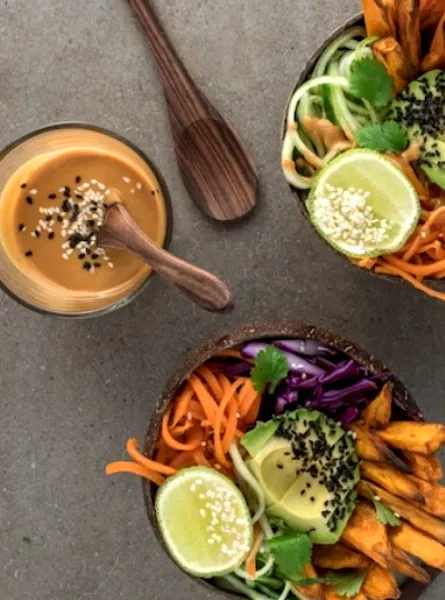
Research is clear on the fact that following a vegetarian lifestyle has numerous health benefits. But what about veganism? Veganism is when someone is restraining all animal products from their diet. This includes meat, but also fish, eggs, cheese, honey and dairy products, amongst others. Here are a few pros and cons of veganism for anyone wanting more information on this lifestyle before heading into it.
THE PROS :
1. Increased consumption of foods that are rich in fiber, vitamins, and minerals.
In general, people following a vegan lifestyle will consume more fruits, vegetables and legumes, which are very high in these key nutrients. Indeed, research does show that we would all benefit from increasing our consumption of plant-based foods! However, it is important to be careful: being vegan does not automatically means being healthy! There are numerous vegetarian or vegan processed foods in stores that can be damaging to our health, as regular processed foods also are. These obviously need to be consumed in moderation.
2. The ethical and ecological aspect.
This aspect if often what drives someone to become a vegan. By avoiding all animal products, it also allows to avoid the ethical dilemma of meat industry and animal cruelty. In addition, the breeding of animals for the meat industry requires an enormous amount of environmental resources, which make veganism advantageous from this point of view.
THE CONS :
1. The feeling of restriction.
For many people, going vegan can be associated with a feeling of restriction, either because some favourite foods are «prohibited» or because it can be difficult to find foods that are vegan when going out. If this is the case, it is important to ask yourself why you are following this lifestyle and research on possible alternatives.
2. Difficulty of meeting nutrient requirements.
When eliminating animal products, it is important to be on the lookout for possible nutrient deficiencies, such as B12 vitamin, calcium, iron or Omega-3, for example. It is entirely possible to not suffer from any deficiency while following a vegan lifestyle. It is essential to be well informed and research the possible alternatives. A dietitian can guide you through this process. There is also a popular belief that vegan people have a hard time meeting their protein needs. This is absolutely false. There are numerous sources of plant-based protein on the market. Being well informed is, once again, a key point.
In conclusion, it is entirely possible to be perfectly healthy and to not miss out on any nutrients while being vegan. It is, however, important to be doing this for yourself and to make sure that these changes are possible and sustainable in the long-term. A nutritionist will be able to guide you through this process and give you all the information necessary to do it the right way and be healthy!





